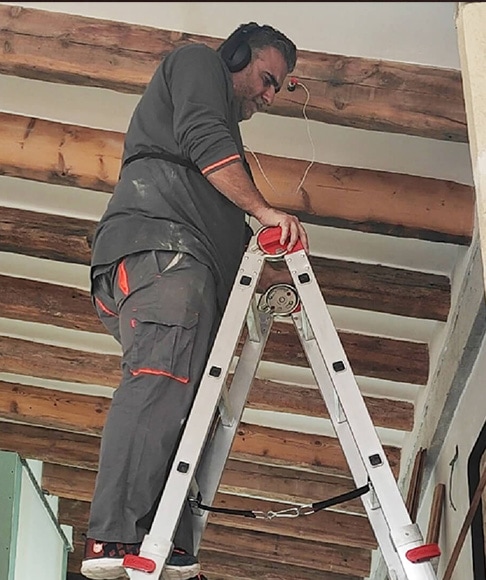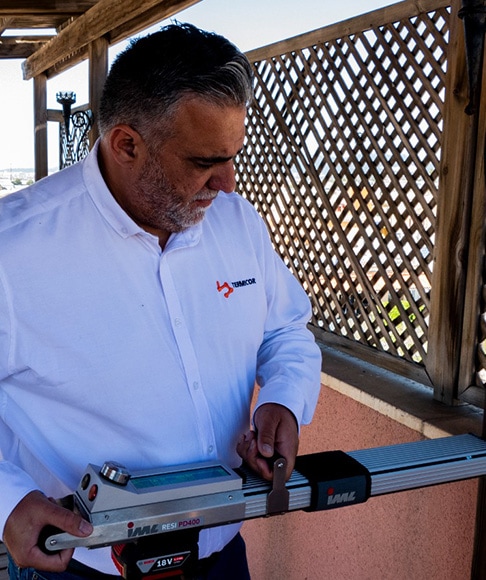PATHOLOGICAL ANALYSIS OF WOODEN STRUCTURES
We diagnose the health of wooden structures such as beams, pillars, etc.
Wood is an ideal material for use in the structure of our homes. Beauty and elegance meet strength and durability, provided that proper maintenance and revisions are carried out.
We produce professional reports backed by our extensive experience and the latest technology.
DO YOU WANT TO KNOW HOW WE DO IT?
We apply a proven methodology that requires extensive experience in the identification of pests in wood. Years of checking the havoc that can be generated in wood due to pests, hundreds of sound inspections and the latest technology enable us to make detailed reports about the health of your beams. Termicor is a young company, but its members have a great deal of experience and professionalism
Visual inspection
Sound analysis
Resistography
Report Issuance
VISUAL INSPECTION
Experience and professionalism is a degree
The first is something as simple and as complex as performing an eye examination of the wood. Thanks to the experience of TERMICOR’s technicians in this first stage, they can appreciate some evidence or indications of the presence of pests in the wood. The different “intruders” that can affect the wood leave traces of their activity in the wood, more visible as the time of action passes. Some stains that, to the untrained eye, may seem typical of wood, are actually areas that will be taken into account for the rest of the inspection to be carried out.
In this visual inspection, TERMICOR technicians check the entire surface of the beams looking for these traces and identifying the most suitable places to find and identify the pathogen that is damaging the wood and, consequently, weakening the structure of the building.
These places that have been identified are where, later and together with others that are identified through sound analysis, the degree of damage that the wood of the beam has suffered will be determined, establishing the most appropriate measures for its correction

SOUND ANALYSIS

Pest Sound Effects
It can be strange to see a person dressed in helmets, standing on a ladder still and in silence. But it is a highly effective technique for detecting the presence of pests in wood.
Before the destructive activity of pests becomes evident in the wood, the presence of insects inside can already be appreciated by listening with the appropriate equipment for the identification, especially of termites, but it is also effective for woodworm and some other species.
This system completes the previous visual analysis by identifying all the areas of the structure that must be analysed in order to quantify the damage caused by pests before deciding on the treatment to be applied.
RESISTOGRAPHY
Non-invasive wood diagnostics
But what is a resistograph? It is a measuring instrument made for use on wood materials. By using a fine needle that penetrates the wood, it measures the resistance of its advance and can export this information for study, obtaining a truthful result of the condition of the wood. The needle it uses is so thin that the resistograph can be considered a non-invasive method of diagnosing wood.
One of the most important advantages is the portability of the equipment that allows the work to be carried out on site, also counting on the results immediately, allowing decisions to be made on site, such as replacement or reinforcement.
It also allows access to elements that are difficult to access , such as embedding beams or joists in walls and walls.
Resistography, therefore, provides an unbeatable diagnosis to establish the plan of care and treatments to be carried out with the aim of restoring the health of the wood in our home.

ISSUANCE OF REPORT
Once all the data has been collected, we prepare the report with the results obtained during the inspection of the wooden structure.
In this report you will find:
Summary
Result of the inspection, detail of the incidents detected and photographic compilation
Pests detected
Biological files of the pests detected
Identified Damage
Detail of the damaged sections and their estimated loss in percentage
Location
Location of the damaged areas found in the property
Measures or treatments
Corrective measures or recommended treatments
Budgets
Economic valuation